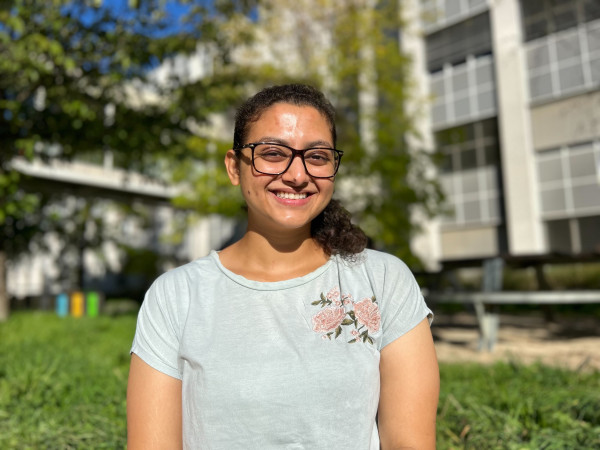Ayesha Ulde
Interview by Nicola Nosengo, NCCR MARVEL in December 2023.
Have you always been interested in science?
My mother has a bachelor's in botany. So I grew up in this background of science. And I've always been very curious, always questioning why things happen in a certain way. I've always been inclined towards science. Then at school, we started talking about atoms and molecules and reactions happening and I thought it was really cool, even basic phenomena such as the curdling of milk fascinated me.
At high school in India, if you choose to study science you have an option to pursue either physics- chemistry-math or physics-chemistry-biology. Biology wasn't something I was super interested in at that point, so I took physics-chemistry-math. Then I took the Joint Entrance Examination, and because of the rank of that exam, I had an option to choose metallurgical and materials engineering for my studies at IIT Madras. I am really happy that I made that choice because it has opened up so many doors for me, and it helped me explore things that I probably wouldn't have otherwise. One of the things that I'm grateful for is the interdisciplinary nature of my degree. I have been able to work at the intersection of materials science and computational engineering and that has been an incredible experience.

Ayesha Ulde
How did you hear about the INSPIRE Potentials Program?
While learning density functional theory, I came across videos by Michele Ceriotti and so I dived a bit more into his research and found this paper whose first author was Jigyasa Nigam, who is now my friend. I read up a bit about her and her background and I found out that she had done this fellowship. I connected with her on LinkedIn and spoke to her and she encouraged me to apply.
What is the topic of your master’s project?
I am predicting precipitates in magnesium alloys using first-principles techniques. Magnesium-based alloys are light-weight, relatively cheap, and have biodegradation properties, which makes them a good candidate for biomedical applications such as temporary implants. Their macroscopic properties such as strength and corrosion resistance can be altered through precipitation of secondary phases. The existing literature hints towards the structure of precipitates in the Mg-Ca-Zn alloys but the thermodynamic stability and formation pathway is unclear. We want to investigate the thermodynamic driving forces responsible for various precipitates and identify the equilibrium precipitate. So far, we have enumerated hexagonal close-packed (HCP) structures in the Mg-Ca-Zn system and performed density functional theory calculations to relax them. We then fitted a cluster expansion to these structures and simulated annealing using semi-grand canonical Monte Carlo simulations to validate it. Presently, we are investigating the thermodynamic driving forces for known precipitates.
Do you think women face specific challenges in the sciences?
I think we have come quite a long way because I have spoken to my mother and from what she describes, it was far harder when she was pursuing her education. But there’s definitely a long way to go. In particular, I think women are tutored differently. And in general, particularly women of color, are not taught to take up space. It's very important to take up space in order to express your opinions and your perspective, because research calls for it. There's this huge learning curve to become able to do that, and to communicate your ideas. That is one of the most significant challenges we face.
Any advice for young girls interested in science?
Ask questions and do not worry about sounding stupid. It is absolutely fine to not know something. Talk to people, ask them what they're doing. If you don't understand something, ask about it, without the fear of being judged. At the end of the day, we're all just here to learn. And I think it doesn't matter if you don't know everything. It's curiosity and receptivity of one’s mind that matters.
What are your plans for the future?
I wish to pursue a Ph.D. in computational materials science. One of my long-term goals is to help bridge the gaps that we now have in the experimental literature on materials, using computational methods. My current master’s project is geared towards that. As for where to live, I am very much open to go anywhere research takes me.
